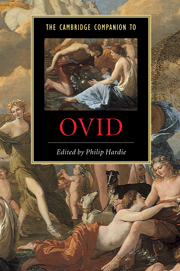3 - Ovid and empire
from Part 1 - Contexts and history
Published online by Cambridge University Press: 28 May 2006
Summary
Born in 43 BC, Ovid enjoyed the benefits of the Augustan principate without witnessing the struggles that brought it into being. As a result, the political and social concerns that find their way into his poetry differ from those that preoccupy his predecessors, such as Virgil, Horace, and Propertius. This generational difference, while routinely acknowledged by Ovidian criticism, is not always given the weight that it deserves, inasmuch as it is still possible to read of an 'anti-Augustan' Ovid, or an Ovid who endorses libertas in its republican connotation of free political speech. At the same time, the fact that Ovid neither experienced nor shaped the transformation of Rome from republic to principate does not entitle us to interpret his poetry as apolitical, either in intention or impact. Romantic Ovid is as anachronistic as Romantic Virgil or Lucan. The political commitments of Ovid’s poetry differ from those of his predecessors (and successors), but they are no less complex and consequential. Indeed, much as the principate, during Ovid’s lifetime, evolved from a set of institutional arrangements and personal loyalties into a broadly based cultural hegemony that incorporated new or revised discourses of authority, sexuality, and religion, and new conceptions of space and time, so too does Ovid’s poetry raise the stakes on his predecessors, moving outward from the quintessential early Augustan concern with the refoundation of Rome to a late Augustan survey of empire.
- Type
- Chapter
- Information
- The Cambridge Companion to Ovid , pp. 46 - 61Publisher: Cambridge University PressPrint publication year: 2002
- 14
- Cited by



